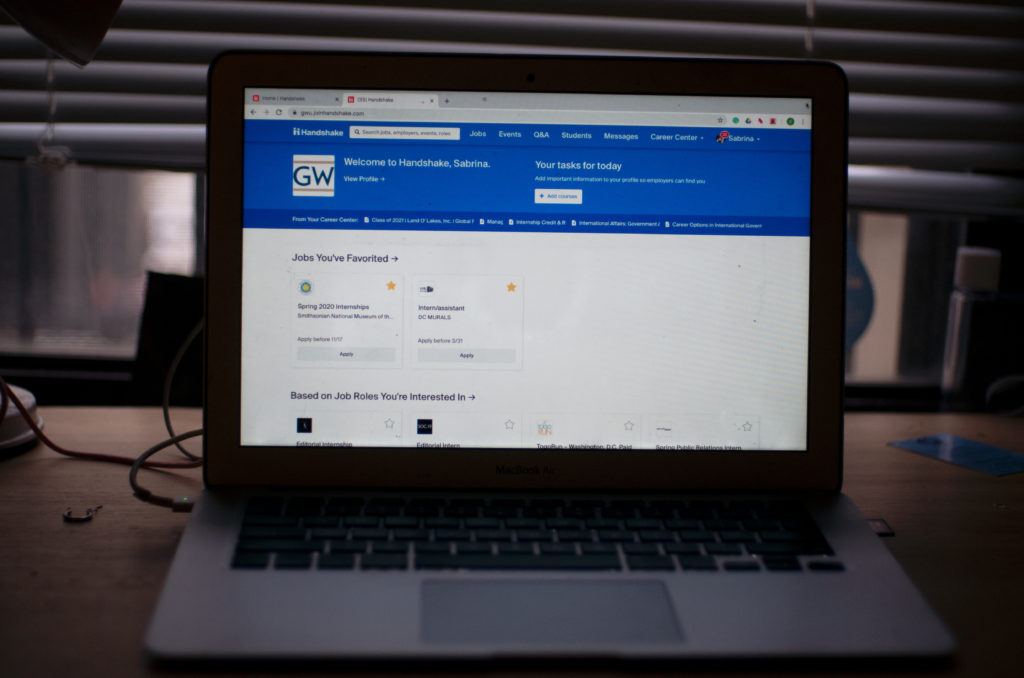More students at GW have activated their profiles on the University’s job-finding platform than students have at similarly-ranked schools using the platform.
Officials said more than 80 percent of students have activated their profiles on Handshake, a platform for jobs and internships made available to students since 2017. Students can customize their profiles to receive more specialized job postings and career assistance, which appeals to many students and sells them on the career search resource, officials said.
Rachel Brown, the associate vice provost for University career services, said GW’s activation rate was the highest of its market basket schools that Handshake ranked.
“Student access to career programs has increased through GW’s move to Handshake in 2017,” she said in an email. “Handshake is available to all GW students and all career programs and events are listed in Handshake.”
GW adopted Handshake in summer 2017 after dropping the in-house career management service GWork. Two of GW’s peer schools, the University of Miami and Boston University, also use Handshake.
Michael McKenzie, the managing director of career and learning experience, said students who use Handshake receive more notifications about jobs and internships based on their career interests than the previous platform offered.
“When students activate their account, they go through the account set-up process which has a major impact on how well the Handshake and career staff can help students find the right information and opportunities,” he said in an email.
Officials started using Handshake to list job fairs and webinars for federal work-study students last summer.
McKenzie said information like experience and skills from student profiles helps center staff identify what resources to offer students and how to advise academic departments on student interests and needs.
He added that students participating in Handshake also benefit from the network of students who they can search for by career interest to gather information about particular internships or firms during the job search.
“We also encourage first- and second-year students who are building their profiles to review junior and senior profiles with similar interests to learn more about the experiences that may have helped them get key internships,” he said in an email.
McKenzie said Handshake also assists students in building their resumes by giving them tips and guidance, which can benefit students looking for internships and jobs by bolstering their applications.
Career center experts said students who activate their Handshake profiles see increased chances of successfully finding jobs and internships.
Christian Garcia, the associate dean and executive director of the career center at Miami, said the platform draws students in because of its accessibility and ease of navigation. The platform’s algorithm, which shows students jobs and internship listings based on their profiles’ characteristics, encourages students to use the platform, he said.
Some students at GW who used the service reported two years ago that the simplified system reduced the delay between getting hired and starting a new job.
Garcia said that before Miami switched to using Handshake, the school’s career services platform was “passive” and required employers who wanted to find employees to expend greater effort because the platform’s search function was less sophisticated than Handshake’s.
“But if they open their profile, employers can do searches,” he said. “Handshake will suggest things based on their experience.”
Jon Schlesinger, the career director at Brandeis University, said the system is beneficial to students because without Handshake, students could miss out on many job opportunities that fit their interests.
“Employers can target students based on what they have said they are interested in all across the country,” he said.
Schlesinger said the system is easy to convince students to use because it is “intuitive,” and information is easy to find.
“We get fewer questions about how to use basic features than the previous system,” he said.
Schlesinger added that students were also more inclined to go through the platform for their job hunt because the platform automates some of the work in finding job postings.
Nicole Van Den Heuvel, the director of career services at Rice University, said companies only have so much time and money to use on sending representatives to recruit college students. More participation in Handshake means students can reach employers located in their desired location, she said.
“We want it to be ideally seamless, a one-stop shop for the students and for the employers,” she said. “If Handshake is used in the right way, that’s really what it is.”




